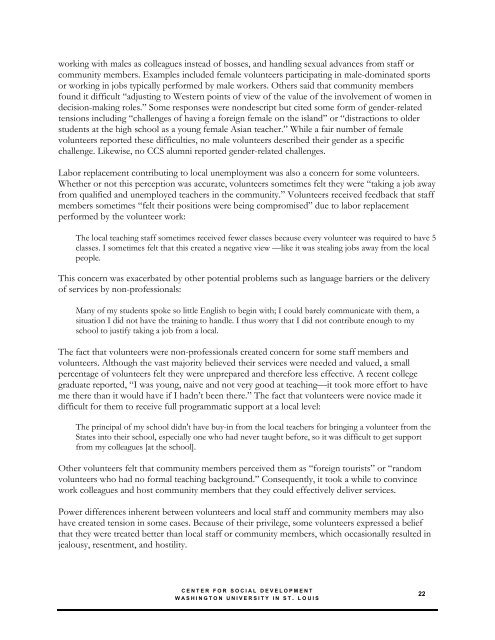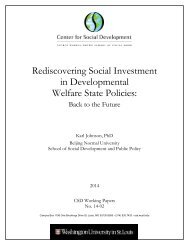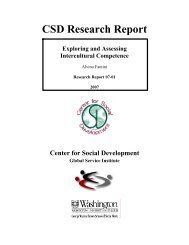Perceived Effects of International Volunteering - Center for Social ...
Perceived Effects of International Volunteering - Center for Social ...
Perceived Effects of International Volunteering - Center for Social ...
Create successful ePaper yourself
Turn your PDF publications into a flip-book with our unique Google optimized e-Paper software.
working with males as colleagues instead <strong>of</strong> bosses, and handling sexual advances from staff or<br />
community members. Examples included female volunteers participating in male-dominated sports<br />
or working in jobs typically per<strong>for</strong>med by male workers. Others said that community members<br />
found it difficult “adjusting to Western points <strong>of</strong> view <strong>of</strong> the value <strong>of</strong> the involvement <strong>of</strong> women in<br />
decision-making roles.” Some responses were nondescript but cited some <strong>for</strong>m <strong>of</strong> gender-related<br />
tensions including “challenges <strong>of</strong> having a <strong>for</strong>eign female on the island” or “distractions to older<br />
students at the high school as a young female Asian teacher.” While a fair number <strong>of</strong> female<br />
volunteers reported these difficulties, no male volunteers described their gender as a specific<br />
challenge. Likewise, no CCS alumni reported gender-related challenges.<br />
Labor replacement contributing to local unemployment was also a concern <strong>for</strong> some volunteers.<br />
Whether or not this perception was accurate, volunteers sometimes felt they were “taking a job away<br />
from qualified and unemployed teachers in the community.” Volunteers received feedback that staff<br />
members sometimes “felt their positions were being compromised” due to labor replacement<br />
per<strong>for</strong>med by the volunteer work:<br />
The local teaching staff sometimes received fewer classes because every volunteer was required to have 5<br />
classes. I sometimes felt that this created a negative view —like it was stealing jobs away from the local<br />
people.<br />
This concern was exacerbated by other potential problems such as language barriers or the delivery<br />
<strong>of</strong> services by non-pr<strong>of</strong>essionals:<br />
Many <strong>of</strong> my students spoke so little English to begin with; I could barely communicate with them, a<br />
situation I did not have the training to handle. I thus worry that I did not contribute enough to my<br />
school to justify taking a job from a local.<br />
The fact that volunteers were non-pr<strong>of</strong>essionals created concern <strong>for</strong> some staff members and<br />
volunteers. Although the vast majority believed their services were needed and valued, a small<br />
percentage <strong>of</strong> volunteers felt they were unprepared and there<strong>for</strong>e less effective. A recent college<br />
graduate reported, “I was young, naive and not very good at teaching—it took more ef<strong>for</strong>t to have<br />
me there than it would have if I hadn’t been there.” The fact that volunteers were novice made it<br />
difficult <strong>for</strong> them to receive full programmatic support at a local level:<br />
The principal <strong>of</strong> my school didn't have buy-in from the local teachers <strong>for</strong> bringing a volunteer from the<br />
States into their school, especially one who had never taught be<strong>for</strong>e, so it was difficult to get support<br />
from my colleagues [at the school].<br />
Other volunteers felt that community members perceived them as “<strong>for</strong>eign tourists” or “random<br />
volunteers who had no <strong>for</strong>mal teaching background.” Consequently, it took a while to convince<br />
work colleagues and host community members that they could effectively deliver services.<br />
Power differences inherent between volunteers and local staff and community members may also<br />
have created tension in some cases. Because <strong>of</strong> their privilege, some volunteers expressed a belief<br />
that they were treated better than local staff or community members, which occasionally resulted in<br />
jealousy, resentment, and hostility.<br />
C ENTER FOR S OCIAL D EVELOPMENT<br />
W ASHINGTON U NIVERSITY IN S T . L OUIS<br />
22
















